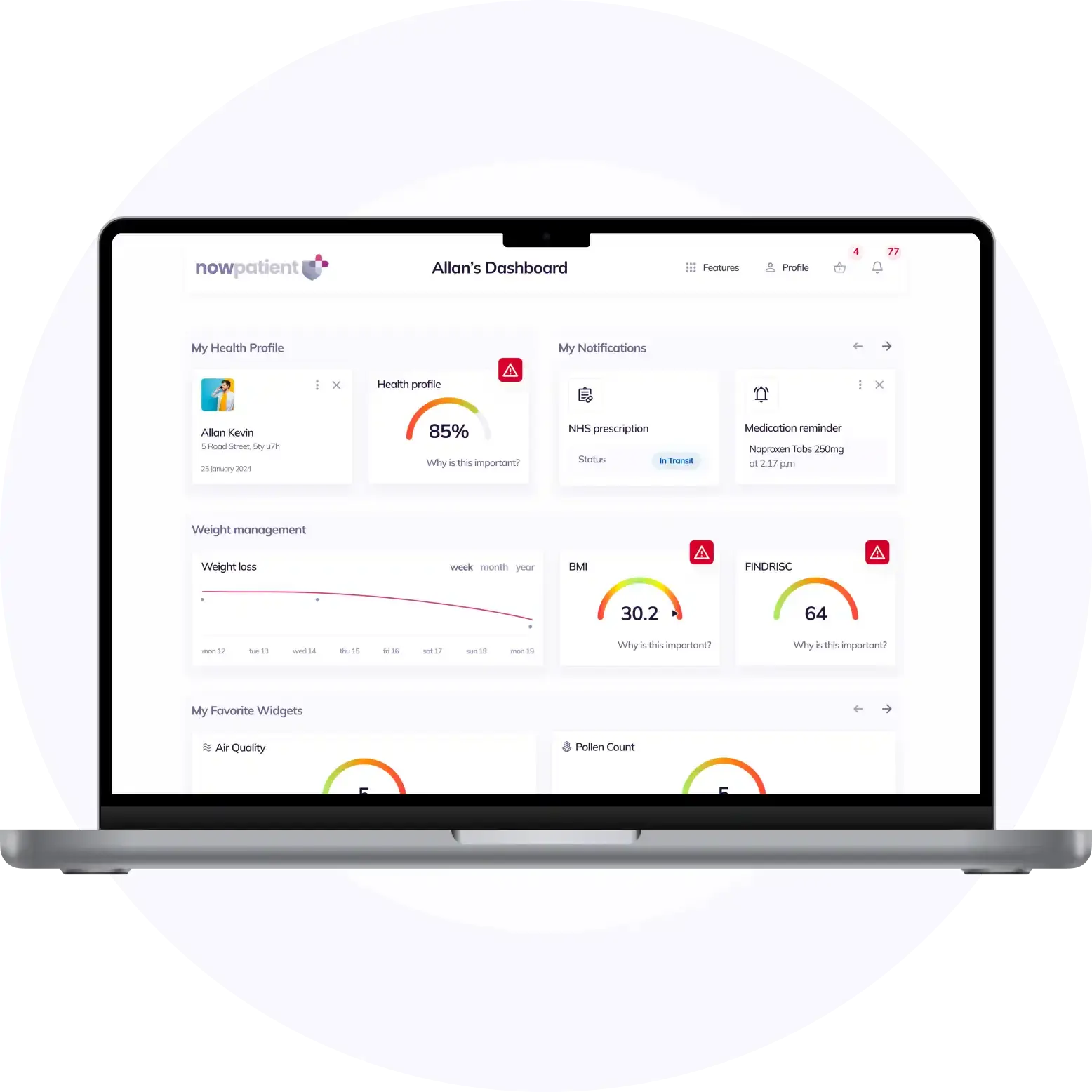Jet Lag
Treatment & Medications
With NowPatient's private treatment plans you can treat Jet Lag safely and easily in a few simple steps. Get started by selecting the available treatments you are interested in below or by hitting the start consultation button.
This content is intended for UK audiences only
Available treatments
Compare treatments
Get started with the right treatment for you
Treatments & Medications
delivery
service

Jet lag is a common problem people get when travelling across time zones. This is a temporary problem, but can still cause tiredness, insomnia, changes in body temperature, mental health issues and stomach upset. Here, we will take a closer look at the causes, symptoms, and ways to manage and prevent Jet lag.
What is Jet Lag?
Jet lag (jet lag disorder), is a short term sleep disorder that occurs when your internal circadian clock is out of tune with local time. Circadian rhythm is your body’s internal clock. It regulates your sleep-wake cycles and metabolism and is affected by daylight and darkness, which help to maintain your sleep schedule.
When you travel across a number of time zones, your internal clock struggles to adapt to the new time zone, causing a disruption in your sleep patterns. Frequent flyers, such as pilots, flight attendants, and business travellers generally suffer from Jet lag the most.
Causes of Jet Lag
Jet lag occurs when your body clock is out of sync with the local time. This is caused by:
Disruption of Circadian Rhythms
These rhythms are regulated by your sleep-wake cycle. Exposure to light plays a large part in aligning your internal clock. Exposure to light changes when you travel across time zones, causing your circadian rhythms to be out of line with local time.
Length and direction of travel
Travelling East tends to cause more intense symptoms of jet lag compared to travelling West. Also, the more time zones you travel across, the greater your circadian rhythms is disturbed and the greater your symptoms of jet lag.
Individual factors
The elderly may find it more difficult to adjust to a new time zone than younger people. Sleep patterns, general health, and the ability to adapt to change will also impact how you are affected by jet lag.
Symptoms of Jet Lag
Jet lag may affect both your physical and mental health. Symptoms tend to appear within 1 or 2 days after traveling. Common symptoms include:
Sleep problems
You may have difficulty falling asleep or wake too early. You may have broken sleep, and poor sleep quality, leaving you feeling unrested.
Daytime tiredness
Jet lag may cause daytime sleepiness and feelings of tiredness, making it difficult to stay alert during the day.
Digestive issues
These may include diarrhoea, constipation, bloating, stomach discomfort, and changes in appetite.
Mood disturbances
Jet lag may cause irritability, mood swings and anxiety. Mood changes are often due to a disruption of your sleep patterns
Physical and cognitive impairment
You may find it more difficult to concentrate, remember information, or make decisions. Your coordination and reaction time, may also be affected by jet lag.
How is Jet Lag different to travel fatigue?
Feeling tired after you’ve had a long days travel can be confused with Jet lag. Travel fatigue, however includes symptoms such as tiredness and headaches, that may occur due to the physical stress of travel.
As a result of air travel you may experience respiratory problems, dehydration, bloating, swelling in your lower-limbs and general fatigue, causing you to feel very tired after a long flight. This is not the same as Jet lag, as travel fatigue does not affect your circadian rhythm. Travel fatigue will also go away after a good night’s rest, while Jet lag can continue for days or even weeks. It is possible for you to have both travel fatigue and Jet lag after a long flight, but Jet lag is more likely to have longer lasting symptoms.
Managing and preventing Jet Lag
Several strategies can help reduce the effects of jet lag. By following these recommendations, you can reduce discomfort and improve your overall well-being during and after long-distance travel.
Plan ahead
Adjust your sleep schedule before you travel to match the time zone you are travelling to. This adjustment may help you adapt to the new time zone more smoothly.
Stay hydrated
Drink plenty of water before, during, and after your flight to prevent dehydration. Good hydration will support your general well-being and reduce some of the discomfort caused by jet lag.
Time your light exposure
Exposure to light is important to help regulate your circadian rhythms. If traveling East, expose yourself to bright light in the morning, to help you adjust your internal clock. If traveling West, expose yourself to bright light in the evening. Also, time outdoors and exposure to natural light will help you to adjust to the local time.
Optimize sleep environment
Create an environment, friendly to sleep to promote good sleep. Eye masks, earplugs, and white noise machines to block out any potential disturbances. Maintain a cool and comfortable temperature in your sleeping area, and ensure that the room is dark and quiet. Bringing familiar items, such as a favorite pillow or blanket, can also help create a sense of comfort and familiarity.
Avoid excessive caffeine and alcohol
While a cup of coffee or tea can help you stay alert during the day, it’s important to moderate your caffeine intake, especially in the afternoon and evening. Caffeine can interfere with sleep and exacerbate the symptoms of jet lag. Similarly, avoid alcohol, as it can disrupt your sleep patterns and dehydrate your body.
Incorporate strategic napping
Short naps can help combat fatigue and increase alertness during the day. Limit your naps to no more than 20-30 minutes and avoid napping too close to bedtime, as it may interfere with nighttime sleep. Strategic napping can provide a quick energy boost without disrupting your sleep-wake cycle.
Consider Melatonin supplements
Melatonin is a hormone produced by your body to help make you feel sleepy and manage your circadian rhythm. It is normally produced in the evening, several hours before bedtime, and is released at night. Your natural cycle of producing Melatonin can be disrupted by Jet Lag.
Melatonin is available only with a prescription in the U.K. but is available as a dietary supplement in some other countries. 1 to 3mg of Melatonin can be used to reset your body clock and help with sleep if taken at the right time. Research shows that Melatonin may help to reduce jet lag. Melatonin, like light, can affect your body clock. The timing of when you take Melatonin is very important. Some people however, are recommended not to take Melatonin. You should check whether it is safe for you to take Melatonin with your doctor. You are advised not to take Melatonin for the first time on your flight, in case you have an adverse reaction.
Alternatives to Melatonin include prescription drugs and over-the-counter medicines. Natural sleep aids, will help you fall asleep or stay asleep, but will not change your circadian rhythm. Sleeping pills may cause side effects, such as drowsiness. Speak to your doctor before you travel to discuss the risks and benefits of each medication.
Follow local time
Once you arrive at your destination, adjust your routines to those of the local time. Your body will adjust to the new time zone if you stick to the local times.
Conclusion
Jet lag can affect your sleep patterns when you travel across multiple time zones. Understanding jet lag, its causes and taking the necessary steps, will help reduce it effects, making it easier for you to adjust to a different time zone.
Sources
Medical Disclaimer
NowPatient has taken all reasonable steps to ensure that all material is factually accurate, complete, and current. However, the knowledge and experience of a qualified healthcare professional should always be sought after instead of using the information in this page. Before taking any drug, you should always speak to your doctor or another qualified healthcare provider.
The information provided here about medications is subject to change and is not meant to include all uses, precautions, warnings, directions, drug interactions, allergic reactions, or negative effects. The absence of warnings or other information for a particular medication does not imply that the medication or medication combination is appropriate for all patients or for all possible purposes.
What is NowPatient
Telehealth and Online Pharmacy
NowPatient is a licensed online pharmacy and doctor service that is available around the world. Our service is FREE and packed with valuable features that can benefit your health such as medication reminders, educational blogs, medically approved symptoms checker, UK NHS online pharmacy, private treatment plans, Rx Advantage card, health conditions information, affordable medications options, genetic testing, home test kits, health risks, pollen meter, air quality monitor, weight loss plans, drug savings programs and lots more!

WHY WE BUILT NOWPATIENT
To improve the lives of everyone by making high-quality care accessible and convenient
We are here to improve lives. Our service gives you access to smart features and resources that can help empower you to take control of your health and improve your health outcomes. All this, in one place, for FREE. We strive to bring a fresh perspective to managing health. NowPatient can be accessed by downloading the App or using your web browser.
Download our app today

Can I trust NowPatient
Meet our medical team
We are a passionate group of clinicians and medical writers covering a broad range of specialities with experience operating in health systems in the United Kingdom & United States. Providing excellent care and advice is at the heart of everything we do. You can read more about our medical team by visiting the medical team page or learn more about how we curate content by visiting our editorial process
